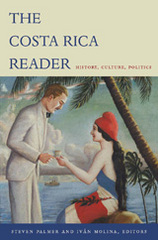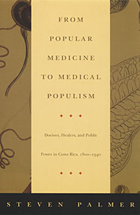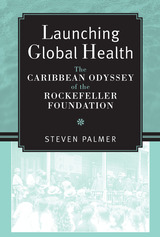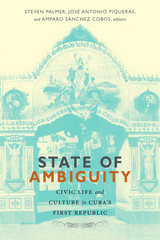
This essential introduction to Costa Rica includes more than fifty texts related to the country’s history, culture, politics, and natural environment. Most of these newspaper accounts, histories, petitions, memoirs, poems, and essays are written by Costa Ricans. Many appear here in English for the first time. The authors are men and women, young and old, scholars, farmers, workers, and activists. The Costa Rica Reader presents a panoply of voices: eloquent working-class raconteurs from San José’s poorest barrios, English-speaking Afro-Antilleans of the Limón province, Nicaraguan immigrants, factory workers, dissident members of the intelligentsia, and indigenous people struggling to preserve their culture. With more than forty images, the collection showcases sculptures, photographs, maps, cartoons, and fliers. From the time before the arrival of the Spanish, through the rise of the coffee plantations and the Civil War of 1948, up to participation in today’s globalized world, Costa Rica’s remarkable history comes alive. The Costa Rica Reader is a necessary resource for scholars, students, and travelers alike.

Steven Palmer breaks with the view of popular and professional medicine as polar opposites—where popular medicine is seen as representative of the authentic local community and as synonymous with oral tradition and religious and magical beliefs and professional medicine as advancing neocolonial interests through the work of secular, trained academicians. Arguing that there was significant and formative overlap between these two forms of medicine, Palmer shows that the relationship between practitioners of each was marked by coexistence, complementarity, and dialogue as often as it was by rivalry. Palmer explains that while the professionalization of medical practice was intricately connected to the nation-building process, the Costa Rican state never consistently displayed an interest in suppressing the practice of popular medicine. In fact, it persistently found both tacit and explicit ways to allow untitled healers to practice. Using empirical and archival research to bring people (such as the famous healer or curandero Professor Carlos Carbell), events, and institutions (including the Rockefeller Foundation) to life, From Popular Medicine to Medical Populism demonstrates that it was through everyday acts of negotiation among agents of the state, medical professionals, and popular practitioners that the contours of Costa Rica’s modern, heterogeneous health care system were established.

"With a clear and engaging narrative that delves into complex and debatable issues and, at the same time, tells very entertaining stories, this book is a wonderful addition to the historiography of international health."
---Diego Armus, Swarthmore College
From the Rockefeller Foundation to the Bill and Melinda Gates Foundation, U.S. philanthropies have played a leading role in the evolution of international health. Launching Global Health examines one of the earliest of these initiatives abroad, the Rockefeller Foundation's International Health Board. The flagship agency made its first call in British Guiana in 1914 to experiment with its new "American method" for the treatment of hookworm disease. Within months it was involved in ambitious hookworm programs in six Central American and Caribbean sites, its directors self-consciously choosing to test run the prototype for their global project in the nearest and clearest domain of American imperial influence. These efforts continued until 1930, when most of the International Health Board hookworm campaigns had evolved into public health projects of a different nature.
Launching Global Health is the first book to explore the inaugural Rockefeller Foundation campaigns in depth and to treat them as an ensemble---as a laboratory for discovering and testing the elements of a global health system for the twentieth century. Orienting the study according to the priorities and perspectives of the social and cultural history of medicine and marrying the results with social science and institutional approaches, Steven Palmer rediscovers elements and dynamics in the original history of global health that were either discarded or that have continued to operate beneath the radar of scholarship.
In particular, Palmer examines the extraordinary encounters that took place between the Rockefeller proselytizers of biomedicine and public health and the diverse populations whom they were attempting to help. Launching Global Health devotes special attention to the health narratives and practices of laboring people of different ethnicities and how they clashed and blended with the stories and rituals being promoted by the Rockefeller Foundation, ultimately showing the locally assembled health teams of microscopists, inspectors, and dispensers to have been active agents in the shaping of encounters between imperial and popular medicine.
Steven Palmer is Canada Research Chair in the History of International Health at the University of Windsor and author of From Popular Medicine to Medical Populism: Doctors, Healers, and Public Power in Costa Rica, 1800-1940.
Illustration: Lecture on hookworm disease on public building porch. Courtesy Rockefeller Archive Center.
A volume in the series Conversations in Medicine and Society.

Contributors. Imilcy Balboa Navarro, Alejandra Bronfman, Maikel Fariñas Borrego, Reinaldo Funes Monzote, Marial Iglesias Utset, Steven Palmer, José Antonio Piqueras Arenas, Ricardo Quiza Moreno, Amparo Sánchez Cobos, Rebecca J. Scott, Robert Whitney
READERS
Browse our collection.
PUBLISHERS
See BiblioVault's publisher services.
STUDENT SERVICES
Files for college accessibility offices.
UChicago Accessibility Resources
home | accessibility | search | about | contact us
BiblioVault ® 2001 - 2024
The University of Chicago Press









